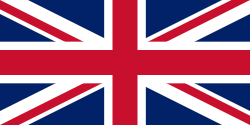
Back الرياضة في المملكة المتحدة Arabic Sport i Storbritannien Danish Sport im Vereinigten Königreich German Deporte en el Reino Unido Spanish ورزش در بریتانیا Persian Sport nel Regno Unito Italian Idrett i Storbritannia NB Sportul în Regatul Unit Romanian Спорт в Великобритании Russian Спорт у Уједињеном Краљевству Serbian
| Part of a series on the |
| Culture of the United Kingdom |
|---|
 |
Sport holds a central place in British culture, and the United Kingdom has played a key role in both the development and global spread of many sports. In the early stages of organised sport, the Home Nations (England, Scotland, Wales, and Ireland) were instrumental in establishing formal rules and forming some of the earliest governing bodies, national teams, and domestic league competitions.
Following the partition of Ireland in 1922, some sports organisations created separate governing bodies for Northern Ireland, while others, including most of the larger and more prominent team sports such as rugby union, cricket and hockey, continued to operate on an all-Ireland basis. In soccer, uniquely, the teams from the new Irish Free State instigated the new organisation (now the Football Association of Ireland) as the original Irish Football Association was based in and seen to be heavily influenced by, Belfast-based teams.
As a result, in many sports, but not all, competitions are organised on a Home Nations basis, with England, Wales, Scotland, and Ireland (and sometimes Northern Ireland) being recognised as distinct entities. In the case of cricket, England and Wales are combined under the England and Wales Cricket Board, but their teams are simply called England, while Ireland and Scotland maintain different teams and organisations. This approach contrasts with most other countries, where a single national team represents the entire state in international competitions. The acceptance of this unique arrangement reflects the key historic importance of the Home Nations in the creation of many sports and international competitions.
In a small number of sports, these teams are supplemented by high-profile events, featuring a combined team representing one or more Home nations. The most notable examples of such arrangements are the British and Irish Lions in rugby union (and formerly the British Lions in rugby league), the Walker Cup golf team and Great Britain at the Olympics in relation to Olympic sports ordinarily organised on a Home Nations basis.
In other sports, especially individual Olympic sports such as athletics, swimming, cycling and triathlon, or those team sports invented outside the United Kingdom (e.g. basketball, baseball, ice hockey, lacrosse and volleyball), the United Kingdom generally participates as one nation, usually under the name Great Britain or, more rarely, as Great Britain and Northern Ireland; the latter is the official name of the United Kingdom's team at the Olympic Games, though it is commonly referred to, not uncontroversially, as the former - the trademarked brand name for the team of the British Olympic Association is "Team GB". Teams rarely, if ever, compete under the designation 'United Kingdom',[1] reflected in the standard abbreviations GB and GBR. Before the founding of the Irish Free State, the name of the Olympic team was commonly given as Great Britain and Ireland with a standard abbreviation or Olympic code of either GBR or BRI.
Overall, association football attracts the most viewers and money, though the nation is notable for the diversity of its sporting interests, especially at the elite level. Great Britain has a special affinity with both Olympic Sport as the only nation to win at least one gold medal at every Summer Games, and with Paralympic Sport as the birthplace of the modern Paralympic movement in Stoke Mandeville Hospital in 1948. The capital London was the first city to host three Summer Olympic Games, and the United Kingdom has twice hosted the Paralympic Games, in London in 2012 and in Stoke Mandeville in 1984.
Major individual sports include athletics, cycling, golf, motorsport, and horse racing. The United Kingdom hosts significant major events across many sports annually, which see a seasonal uptick of interest in that sport for the duration of the event, including one of the four 'major' or 'grand slam' events in both tennis and men's golf. Tennis is the highest profile sport for the two weeks of the Wimbledon Championships. Snooker and darts, too, enjoy period profile boosts in line with the holding of their largest events, both of which are based permanently in England. The Boat Race in rowing, the All England Open Badminton Championships, Badminton and Burghley Horse Trials in three-day eventing, the London Marathon enjoy similar global renown within their fields, and peak interest for short periods nationally. The Open Championship in golf also peaks periodic interest domestically as the only non-US and oldest Major, but golf maintains a reasonably high-profile throughout the year and is a significant social sport.
Many other sports are also played and followed to a lesser degree. There is much debate over which sport has the most active participants with swimming, athletics, and cycling all found to have wider active participation than association football in the 2010 Sport England Active People Survey.[2] The United Kingdom is widely considered one of the top performing sporting nations in the world.[3][4][5]
- ^ As compared, for example, with the Eurovision Song Contest where the entry representing the nation is referred to as "United Kingdom" and "Royaume-Uni", it's direct French language equivalent.
- ^ "Sports Council for England". Sport England. 2010. Archived from the original on 4 July 2011. Retrieved 21 June 2011.
- ^ "Top 10 Greatest Sports Countries – TheTopTens".
- ^ "Greatest Sporting Nation". Greatest Sporting Nation.
- ^ "Olympics medal table by country". Statista.